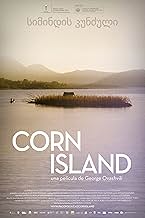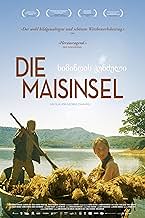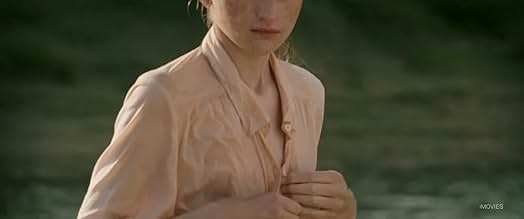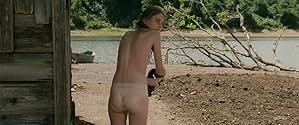VALUTAZIONE IMDb
7,4/10
4786
LA TUA VALUTAZIONE
Il fiume crea e il fiume distrugge, in un ciclo eterno a cui neanche gli uomini possono sottrarsi.Il fiume crea e il fiume distrugge, in un ciclo eterno a cui neanche gli uomini possono sottrarsi.Il fiume crea e il fiume distrugge, in un ciclo eterno a cui neanche gli uomini possono sottrarsi.
- Regia
- Sceneggiatura
- Star
- Premi
- 23 vittorie e 12 candidature totali
Recensioni in evidenza
One of the main goals of art film is to depict life in its most pure, elemental state. Yet few art movies have managed to achieve that goal with as much grace and poetic depth as George Ovashivili's Corn Island. This immaculately composed film takes the viewers on a soul-touching journey into the desolate, breathtakingly beautiful wilderness of a small island in Georgia and perfectly captures the rhythm of nature and the relation between nature and the two main characters whose daily struggles are interweaved into the light, sound and motion of nature around them. Throughout the film, the viewer can't help but feel the life-like, natural quality of every picture and scene. There are no excessive details; everything is distilled into its most natural state. The image of the old man's granddaughter sitting on the boat with a bundle of shining reed under the crisp sunlight is a precise portrait of life itself. In essence, art has blended into life, and life into art. What is more remarkable is that the director has managed to convey this profound state of life without the help of dialogue. Perhaps one could argue that it is precisely the lack of dialogue that has made this film that much more powerful and moving. A scene in the beginning where the old man fondly looks at a little bird pecking at the wood conveys a sense of elegance that no language can easily convey. Even the intermittent gunshots we hear in the background and the discovery of a wounded soldier that temporarily disrupts the tranquility of the island do not lead the film to deviate from its original artistic path. On the contrary, the tension lurking in the background elevates the humanistic aspect of the film to a new height. In the end, every human gesture and activity is dissolved into the larger nature. What we are left with is a film that touches the depth of our soul with such simplicity and gracefulness that very few films can match.
"Corn island" is about islands that run dry in early spring and are swallowed up by the river again during winter. In the meantime it is very fertile land and farmers from the neigbourhood are keen to occupy such an island in order to sow and harvest corn.
From the above description it is clear that "Corn island" is a slow movie about a slow and peaceful live. You can nearly see the corn crow. This slow and peaceful live however is disrupted in multiple ways.
In the first place is the corn island of this movie situated in a disputed territory between two countries. Rival soldiers are regularly passing by the island. The farmer is determined to stay out of this war. Will he succeed? This aspect of the film reminded me of the Dutch novel "The house of refuge" (1952, Willem Frederik Hermans).
A farmers live is always governed by the seasons, but that is especially true if your field is on a temporary island. The second cause of disruption.
Not only the corn is growing, but also the granddaughter of the farmer. This fact does not pass unnoticed by the passing soldiers, forming the third disruptive force. This third aspect of the film is in my opinion the weakest. The coming of age is portrayed using a lot of clichés such as suddenly being tired of your favorite doll or experiencing the first menstrual cycle.
After "In bloom" (2013, Nana Ekvtimishvili) "Corn island" was the second film from Georgia I saw within a year. Remarkable was the large share that the grandparents had in both films in raising their grandchildren. A coincidence?
From the above description it is clear that "Corn island" is a slow movie about a slow and peaceful live. You can nearly see the corn crow. This slow and peaceful live however is disrupted in multiple ways.
In the first place is the corn island of this movie situated in a disputed territory between two countries. Rival soldiers are regularly passing by the island. The farmer is determined to stay out of this war. Will he succeed? This aspect of the film reminded me of the Dutch novel "The house of refuge" (1952, Willem Frederik Hermans).
A farmers live is always governed by the seasons, but that is especially true if your field is on a temporary island. The second cause of disruption.
Not only the corn is growing, but also the granddaughter of the farmer. This fact does not pass unnoticed by the passing soldiers, forming the third disruptive force. This third aspect of the film is in my opinion the weakest. The coming of age is portrayed using a lot of clichés such as suddenly being tired of your favorite doll or experiencing the first menstrual cycle.
After "In bloom" (2013, Nana Ekvtimishvili) "Corn island" was the second film from Georgia I saw within a year. Remarkable was the large share that the grandparents had in both films in raising their grandchildren. A coincidence?
Every spring the Inguri River, which forms the boundary between Georgia and Abkhazia, washes down rocks and soil creating tiny islands. Local peasants leave the riverbanks for the firm, fertile island soil to grow corn through the summer before they are eroded away by winter. Georgia's submission for Best Foreign Language Film Corn Islanddirected by George Ovashvili follows a nondescript ageing farmer and his naive granddaughter as they migrate to an island and cultivate a year's crop. During such time, border patrols from both Georgia and Abkhaz pass by, causing tensions to rise between each other while the protagonists are caught in the middle.
Corn Island provokes an idea most memorable in the finale of Jean Renoir's The Grand Illusion – this illusion being the definitions of land ownership. Through nature's creation of a temporary island and then the Old Man's claim of his own little country, the film poetically points out the irrationality of conflict over differences from being born on different pieces of land. It's thoroughly profound, but one only teased in the otherwise sparse film. Ovashvili's approach is very reminiscent of the work of Ki-duk Kim, especially Spring, Summer, Fall, Winter and Spring, with the tranquil relationship with nature, meditative pace and limited dynamics, but equal in their beauty.
The narrative is procedural, simply watching the characters build a hut, plant the seeds and farm the crop. It's lethargic, but engaging. For the most part, the characters are blank slates, but it's about what they represent. It's all about the elements, and they're always fragile and unbalanced, as the film works on the natural tension of impending and inevitable expiration. Tensions do rise when the soldiers pass by in the boats, and there is character development with the granddaughter, who's in the throes of puberty. As she catches their eye and they to her, her internal conflict about her desires for outsiders illustrates the fateful and fatal sparks between nations.
The film's elegance is owed to the precise and impressive aesthetics. Veteran Hungarian cinematographer Elemer Ragalyi's serene gliding photography captures the world on a grand but desolate scale. In essence, the film is a soundscape, with no dialogue and hardly any score until near the end. The sharp sound work creates a palpable atmosphere like last year's All is Lost. The film does suffer in its rare moments of dialogue as Ovashvili is more confident in the naturalistic poetry of man against man and man against nature but those scenes don't drag the film down. Corn Island is a slow-burning but well-executed thought- provoking film that's worth watching, especially for fans of art cinema on the lookout for fresh faces.
8/10
Read more @ The Awards Circuit (http://www.awardscircuit.com/)
Corn Island provokes an idea most memorable in the finale of Jean Renoir's The Grand Illusion – this illusion being the definitions of land ownership. Through nature's creation of a temporary island and then the Old Man's claim of his own little country, the film poetically points out the irrationality of conflict over differences from being born on different pieces of land. It's thoroughly profound, but one only teased in the otherwise sparse film. Ovashvili's approach is very reminiscent of the work of Ki-duk Kim, especially Spring, Summer, Fall, Winter and Spring, with the tranquil relationship with nature, meditative pace and limited dynamics, but equal in their beauty.
The narrative is procedural, simply watching the characters build a hut, plant the seeds and farm the crop. It's lethargic, but engaging. For the most part, the characters are blank slates, but it's about what they represent. It's all about the elements, and they're always fragile and unbalanced, as the film works on the natural tension of impending and inevitable expiration. Tensions do rise when the soldiers pass by in the boats, and there is character development with the granddaughter, who's in the throes of puberty. As she catches their eye and they to her, her internal conflict about her desires for outsiders illustrates the fateful and fatal sparks between nations.
The film's elegance is owed to the precise and impressive aesthetics. Veteran Hungarian cinematographer Elemer Ragalyi's serene gliding photography captures the world on a grand but desolate scale. In essence, the film is a soundscape, with no dialogue and hardly any score until near the end. The sharp sound work creates a palpable atmosphere like last year's All is Lost. The film does suffer in its rare moments of dialogue as Ovashvili is more confident in the naturalistic poetry of man against man and man against nature but those scenes don't drag the film down. Corn Island is a slow-burning but well-executed thought- provoking film that's worth watching, especially for fans of art cinema on the lookout for fresh faces.
8/10
Read more @ The Awards Circuit (http://www.awardscircuit.com/)
About cinema it is said that sometimes images convey perfectly what words fail to express. When words are uttered they make sense only when they merely suit the situations for which they were spoken. This effect is shown in Georgian film "Corn Island" with utmost austerity as an old man and his young grand-daughter set foot on a small island in the middle of a river. Their sudden arrival sets off a climate of distrust in the minds of other people. This is the start of a difficult life for them as there are also others who would like to see them defeated in their mission. There are some films which develop at their own pace. It is likely that laymen would call them slow whereas true admirers of cinema would label them as poetic works of art. Corn Island is one such film which would immensely appeal anybody who appreciates cinema as a poetic art. One can see how the entire process of planting a seed until the final stages of agriculture is carried out. The origin of this poetic film can be traced back to a day in August 1992 when an Abkhazian person ordered Georgian director George Ovashvili to leave Abkhazian black sea coast. According to him the war had started.
George Ovashvili's film was showing on my cable, and I decided to check it out... it's actually a film from a decade ago that made the rounds at every major film festival and ended up with 23 wins and 12 nominations! I must say, it truly deserved every single one of them!
The story, written by Roelof Jan Minneboo, George Ovashvili, and Nugzar Shataidze, transports us to Georgia, where the Inguri River's water level drops annually, revealing islands with fertile river-bottom soil. The locals can temporarily claim these islands for a season to grow crops, so an elderly man in an old wooden boat slowly makes his way to one such island. He measures it, digs the earth, tastes the soil, decides it's suitable, and marks his claim with a piece of cloth on a stick. He leaves and returns repeatedly, bringing supplies, including scrap lumber to build a cabin with a thatched roof, and then planting corn with the help of his teenager granddaughter. Almost no words are spoken, so don't worry if you don't have subtitles (for some reason, I only had German subtitles) - you'll be just fine!
A significant aspect of this film is the profound connection between the man and nature, conveyed through captivating imagery and visuals - a timeless story that seems so primitive... intentionally so, in my opinion.
Another aspect of the film is the island's location: in the middle of the Inguri River, dividing Georgia from Abkhazia. This off-screen conflict brings soldiers from both sides, disturbing the intense bond between nature and the old man and his granddaughter.
The film takes its time with everything, and it follows the nature's pace of the flowing river, growing corn... and it feels great watching things unfolding slowly. Real life feeling! Almost perfect film!
The story, written by Roelof Jan Minneboo, George Ovashvili, and Nugzar Shataidze, transports us to Georgia, where the Inguri River's water level drops annually, revealing islands with fertile river-bottom soil. The locals can temporarily claim these islands for a season to grow crops, so an elderly man in an old wooden boat slowly makes his way to one such island. He measures it, digs the earth, tastes the soil, decides it's suitable, and marks his claim with a piece of cloth on a stick. He leaves and returns repeatedly, bringing supplies, including scrap lumber to build a cabin with a thatched roof, and then planting corn with the help of his teenager granddaughter. Almost no words are spoken, so don't worry if you don't have subtitles (for some reason, I only had German subtitles) - you'll be just fine!
A significant aspect of this film is the profound connection between the man and nature, conveyed through captivating imagery and visuals - a timeless story that seems so primitive... intentionally so, in my opinion.
Another aspect of the film is the island's location: in the middle of the Inguri River, dividing Georgia from Abkhazia. This off-screen conflict brings soldiers from both sides, disturbing the intense bond between nature and the old man and his granddaughter.
The film takes its time with everything, and it follows the nature's pace of the flowing river, growing corn... and it feels great watching things unfolding slowly. Real life feeling! Almost perfect film!
Lo sapevi?
- QuizIn order to find the location for this movie, the filmmakers had been looking for a real island for two years. Eventually, they realised it would be too complicated and too dangerous to film on such a place. Instead, they built the island on an artificial lake, where they could control the water level to some extent, director George Ovashvili revealed in an interview.
- ConnessioniReferenced in CT na MFF Karlovy Vary 2017: Generální reditel Petr Dvorák (2017)
I più visti
Accedi per valutare e creare un elenco di titoli salvati per ottenere consigli personalizzati
- How long is Corn Island?Powered by Alexa
Dettagli
- Data di uscita
- Paesi di origine
- Sito ufficiale
- Lingue
- Celebre anche come
- Simindis kundzuli
- Luoghi delle riprese
- Aziende produttrici
- Vedi altri crediti dell’azienda su IMDbPro
Botteghino
- Budget
- 1.500.000 € (previsto)
- Lordo in tutto il mondo
- 37.445 USD
Contribuisci a questa pagina
Suggerisci una modifica o aggiungi i contenuti mancanti

Divario superiore
By what name was Corn Island (2014) officially released in Canada in English?
Rispondi






















